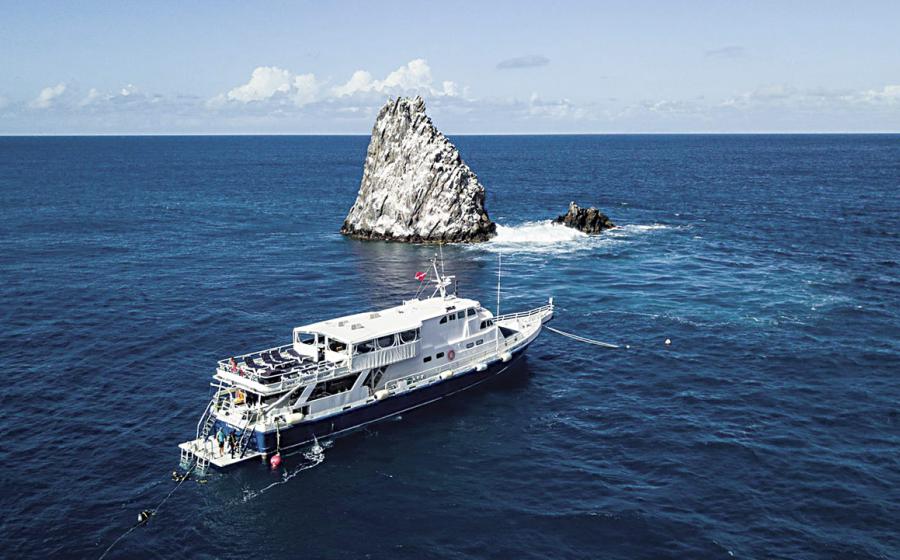Healthy Travel Rx
May 2007
By Selene Yeager
Planning a dream dive vacation in a foreign land? Consider these two statistics: Surveys show about 64 percent of American travelers don't bother seeking medical advice before traveling to exotic locales. The American traveler has a 60 to 70 percent chance of getting sick while traveling to a lesser-developed country. Coincidence? We think not.
"Divers particularly need to be more vigilant about protecting themselves when traveling the world, because they aren't just sitting on the beach or in a resort pool; they're also exposing themselves to the elements," says Eric L. Weiss, M.D., of the International Society of Travel Medicine. Part of that vigilance should be seeking out a doctor who is interested in travel medicine. If your primary care doctor isn't travel-medicine savvy (and can't recommend a colleague who is), go online to the International Society of Travel Medicine (www.istm.org) and click on "Travel Clinic Directory" to find a travel medicine doctor near you.
In the meantime, here's a guide to the preventive medicine you need to travel safely, enjoy your stay, and come home with nothing but memories.
Seek Early Immunization
Many of the world's most common-and deadliest-diseases can be completely prevented by a few simple shots. The key is not waiting until the last minute, because some immunizations aren't fully effective until several weeks after you receive them. "Aim to see your doctor-and receive your shots-about two months before your trip," advises Weiss. Also, keep records of all your shots. Some immunizations are good for life, some for 10 years, and some need boosting every time you travel. The following is a snapshot of the sticks most often recommended for popular dive destinations.
Hepatitis A This is a miserable liver disease that causes flu-like symptoms. Anyone leaving the States should get a Hep A vaccination, since it's easily spread, especially in areas with dicey sanitation standards.
Hepatitis B A serious strain of the hepatitis virus, hepatitis B can cause lifelong infection and fatal liver problems. Though it's usually spread through bodily fluids, divers (and other travelers who may get injured and need medical care abroad) should be inoculated. Combo shots for Hep A and B are now available.
Typhoid A bacterial infection that causes a flu-like disease. It's easily spread through contaminated food and water in unsanitary conditions. Untreated, it can linger for weeks, even months, and can be fatal.
Yellow Fever This mosquito-transmitted, flu-like illness is potentially fatal and on the rise in Africa and South America.
Tetanus-diphtheria Have you had a tetanus shot in the past 10 years? If not, you should get a booster whether or not you travel, but especially if you do. Tetanus is found throughout the world and easily transmitted through skin wounds. Diphtheria is a potentially fatal respiratory disease; the two inoculations are generally bundled in one shot.
Influenza It's always flu season somewhere in the world. High season in the northern hemisphere is November through March. The flu hits hard in the southern hemisphere April through September. Consider adding a flu shot to your immunization arsenal.
MMR This is the measles-mumps-rubella shot many of us received as kids. If you were born after 1956 and before 1970, however, there's a chance you received only one dose against these infectious diseases and you should go for a second dose before taking off. Others should check with their travel medicine doctor to see if a booster is advised.
As people travel and spread germs throughout the world, diseases come along for the ride. Do your homework before you travel. For a complete listing of the immunization recommendations for destinations around the globe, go online to the Centers for Disease Control and Prevention (www.cdc.gov) and click on "Travelers' Health." There you'll find a complete rundown of health risks and vaccination recommendations for every place on the planet.
Pick Up Prophylactics
Malaria is a major health threat around the globe, and particularly in Africa, Central and South America, Asia, Eastern Europe and the South Pacific. Though it's highly preventable, about 12,000 Americans have contracted this serious mosquito-borne sickness during the past 15 years. There's no malaria vaccine at this time, but there are drugs you can take to protect yourself.
If you avoided malaria prophylactics in the past because of their scary side effects, rest assured anti-malarials have come a long way. Scuba divers often resisted taking Lariam (mefloquine), the original anti-malarial, because it can cause drowsiness, joint aches and dizziness-all of which mimic decompression sickness. It may also cause hallucinations. Doxycycline, another popular anti-malarial, is better, but it can cause sun sensitivity-a tough side effect for most sun-scorched dive destinations.
The best choice (especially if you've never taken an anti-malarial drug before): A relatively new drug called Malarone. It's 98 percent effective and protects against the most severe form of the disease, cerebral malaria. You take Malarone once a day starting two days before you leave and continuing seven days after you return. Do not purchase anti-malarial drugs outside of the country.
Play It Smart
Pills and needles can go only so far in protecting you from the army of microscopic invaders out there. Some don't provide 100 percent protection, and even garden-variety bacteria and viruses can turn a dream vacation into a nightmare. Your best medicine is preventive medicine: Avoid the stuff that can make you sick. Wear the strongest mosquito repellent money can buy, looking particularly for DEET-formulated repellents that provide 12- to 24-hour protection. Spray your clothes and luggage with permethrin (a potent insecticide) for extra protection.
When eating abroad, always boil it, cook it or peel it. If it doesn't meet the criteria of being well cooked, forget it. Avoid tap water, fountain drinks, ice cubes, and foods from street vendors or buffets.
Finally, don't forget your health when you come home. If you have any of the following symptoms upon returning home (even weeks later if you've been to a high-risk region), see your doctor ASAP:
Fever
Diarrhea
Vomiting
Jaundice
Urinary tract or genital infections
Rashes or other skin disorders.
May 2007
By Selene Yeager
Planning a dream dive vacation in a foreign land? Consider these two statistics: Surveys show about 64 percent of American travelers don't bother seeking medical advice before traveling to exotic locales. The American traveler has a 60 to 70 percent chance of getting sick while traveling to a lesser-developed country. Coincidence? We think not.
"Divers particularly need to be more vigilant about protecting themselves when traveling the world, because they aren't just sitting on the beach or in a resort pool; they're also exposing themselves to the elements," says Eric L. Weiss, M.D., of the International Society of Travel Medicine. Part of that vigilance should be seeking out a doctor who is interested in travel medicine. If your primary care doctor isn't travel-medicine savvy (and can't recommend a colleague who is), go online to the International Society of Travel Medicine (www.istm.org) and click on "Travel Clinic Directory" to find a travel medicine doctor near you.
In the meantime, here's a guide to the preventive medicine you need to travel safely, enjoy your stay, and come home with nothing but memories.
Seek Early Immunization
Many of the world's most common-and deadliest-diseases can be completely prevented by a few simple shots. The key is not waiting until the last minute, because some immunizations aren't fully effective until several weeks after you receive them. "Aim to see your doctor-and receive your shots-about two months before your trip," advises Weiss. Also, keep records of all your shots. Some immunizations are good for life, some for 10 years, and some need boosting every time you travel. The following is a snapshot of the sticks most often recommended for popular dive destinations.
Hepatitis A This is a miserable liver disease that causes flu-like symptoms. Anyone leaving the States should get a Hep A vaccination, since it's easily spread, especially in areas with dicey sanitation standards.
Hepatitis B A serious strain of the hepatitis virus, hepatitis B can cause lifelong infection and fatal liver problems. Though it's usually spread through bodily fluids, divers (and other travelers who may get injured and need medical care abroad) should be inoculated. Combo shots for Hep A and B are now available.
Typhoid A bacterial infection that causes a flu-like disease. It's easily spread through contaminated food and water in unsanitary conditions. Untreated, it can linger for weeks, even months, and can be fatal.
Yellow Fever This mosquito-transmitted, flu-like illness is potentially fatal and on the rise in Africa and South America.
Tetanus-diphtheria Have you had a tetanus shot in the past 10 years? If not, you should get a booster whether or not you travel, but especially if you do. Tetanus is found throughout the world and easily transmitted through skin wounds. Diphtheria is a potentially fatal respiratory disease; the two inoculations are generally bundled in one shot.
Influenza It's always flu season somewhere in the world. High season in the northern hemisphere is November through March. The flu hits hard in the southern hemisphere April through September. Consider adding a flu shot to your immunization arsenal.
MMR This is the measles-mumps-rubella shot many of us received as kids. If you were born after 1956 and before 1970, however, there's a chance you received only one dose against these infectious diseases and you should go for a second dose before taking off. Others should check with their travel medicine doctor to see if a booster is advised.
As people travel and spread germs throughout the world, diseases come along for the ride. Do your homework before you travel. For a complete listing of the immunization recommendations for destinations around the globe, go online to the Centers for Disease Control and Prevention (www.cdc.gov) and click on "Travelers' Health." There you'll find a complete rundown of health risks and vaccination recommendations for every place on the planet.
Pick Up Prophylactics
Malaria is a major health threat around the globe, and particularly in Africa, Central and South America, Asia, Eastern Europe and the South Pacific. Though it's highly preventable, about 12,000 Americans have contracted this serious mosquito-borne sickness during the past 15 years. There's no malaria vaccine at this time, but there are drugs you can take to protect yourself.
If you avoided malaria prophylactics in the past because of their scary side effects, rest assured anti-malarials have come a long way. Scuba divers often resisted taking Lariam (mefloquine), the original anti-malarial, because it can cause drowsiness, joint aches and dizziness-all of which mimic decompression sickness. It may also cause hallucinations. Doxycycline, another popular anti-malarial, is better, but it can cause sun sensitivity-a tough side effect for most sun-scorched dive destinations.
The best choice (especially if you've never taken an anti-malarial drug before): A relatively new drug called Malarone. It's 98 percent effective and protects against the most severe form of the disease, cerebral malaria. You take Malarone once a day starting two days before you leave and continuing seven days after you return. Do not purchase anti-malarial drugs outside of the country.
Play It Smart
Pills and needles can go only so far in protecting you from the army of microscopic invaders out there. Some don't provide 100 percent protection, and even garden-variety bacteria and viruses can turn a dream vacation into a nightmare. Your best medicine is preventive medicine: Avoid the stuff that can make you sick. Wear the strongest mosquito repellent money can buy, looking particularly for DEET-formulated repellents that provide 12- to 24-hour protection. Spray your clothes and luggage with permethrin (a potent insecticide) for extra protection.
When eating abroad, always boil it, cook it or peel it. If it doesn't meet the criteria of being well cooked, forget it. Avoid tap water, fountain drinks, ice cubes, and foods from street vendors or buffets.
Finally, don't forget your health when you come home. If you have any of the following symptoms upon returning home (even weeks later if you've been to a high-risk region), see your doctor ASAP:
Fever
Diarrhea
Vomiting
Jaundice
Urinary tract or genital infections
Rashes or other skin disorders.






